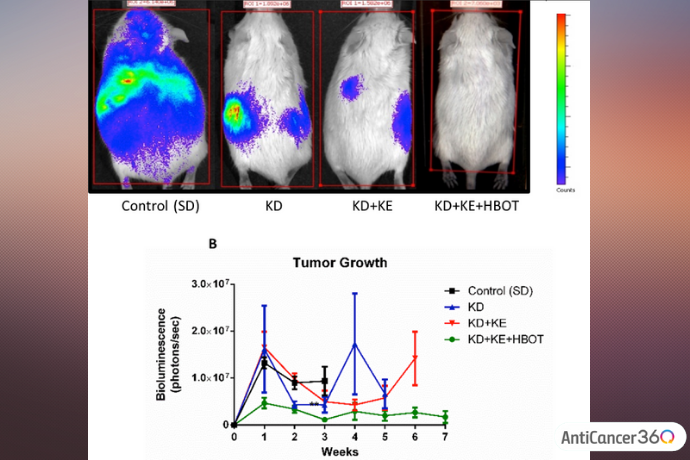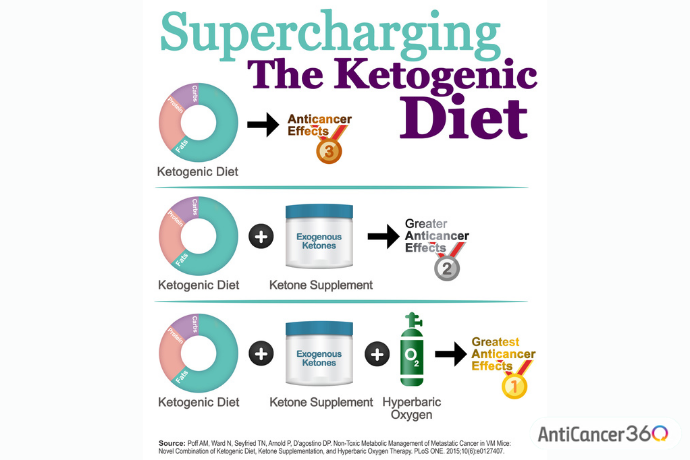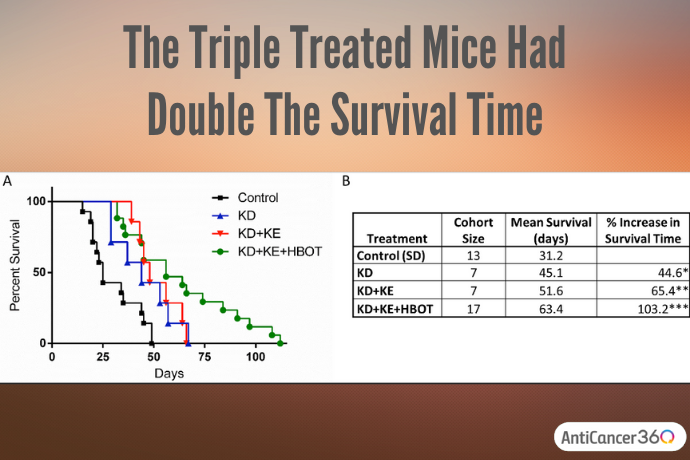Note: The information in this article is for education purposes only. All the techniques mentioned in this guide are intended to be supplements (not replacements) to your oncologist’s care. Please consult with your physician before starting any diet, supplement, or therapy.Don’t have time to read? Here’s a quick summary:
- If you’ve been looking into the ketogenic diet against cancer, you need to know about “exogenous ketones” and “oxygen therapy.”
- Your body generates ketones on a ketogenic diet. But you can also take these ketones in supplement form.
- Exogenous ketones themselves have shown to have anticancer potential, even without a ketogenic diet. They may also help to protect your healthy tissues from the damages of treatments like chemotherapy and radiation therapy.
- But overall, adding exogenous ketones to a ketogenic diet showed greater anticancer effects than a ketogenic diet alone.
- The ketogenic diet may also be synergistic with hyperbaric oxygen therapy. In an animal study, a ketogenic diet alone increase survival time by 55%… but when combined with hyperbaric oxygen, survival increased to 78%.
- Most importantly, combining a ketogenic diet with exogenous ketones, AND hyperbaric oxygen therapy showed the greatest anticancer potential.
- Overall, since these are non toxic approaches that show potential for benefit, their use is warranted when used in addition to your oncologists treatments (with approval of course.)
- And for those who can’t afford regular hyperbaric oxygen treatments things like Multistep Oxygen Therapy, and even aerobic exercise may be able to help.
- Using these techniques together helps you fight the cancer from every angle possible.
Cancers overall, can be adaptable and difficult to overcome. And a technique that helps one person may not be so helpful to the next person. So if you want to fight cancer from all angles, it’s important to know all of the potential options that you have.
One of these techniques is the ketogenic diet. And as we’ll talk about today… there are other techniques that could greatly improve its anticancer effects.
Ketogenic Diets Can Help Against Cancer… And What You Need To Know
For those of you who aren’t familiar, the ketogenic removes all but a tiny bit of sugar and carbohydrates. This can help to fight cancer because it limits the amount of blood sugar and insulin that cancer cells use to grow.
Overall, the ketogenic diet has only undergone preliminary studies against cancer, but with significant success[1][2][3][4]. And while it’s not definitive in its benefits, it’s also a nontoxic approach that may help.
So if it’s something that you’re interested in exploring (and it makes sense for your case,) even these preliminary studies warrant its use, in addition to your oncologist’s care. This also applies to the other supplemental techniques that we’re going to talk about today.
But as you’ll see, if you or anyone you know is using the ketogenic diet to help their case… they also have to know about “exogenous ketones” and “oxygen therapy.”
Exogenous Ketones: Supplemental Ketones WIth Anticancer Effects
If you’ve looked into a ketogenic diet, you probably already know about ketones. These are the fats that your body generates to feed your cells in the absence of sufficient sugar.
So you’re body itself makes ketones when you decrease carbohydrate intake enough, and increase fat intake. It will also do this if you are starving (or have uncontrolled diabetes.)
But there are also “exogenous ketones” which you can take as a supplement. These usually come in powder form, which you can mix into a drink.
In terms of cancer, exogenous ketones are interesting for a few reasons…
First… ketones themselves have anticancer effects, even without a ketogenic diet. Researchers found that giving ketones through supplementation could help to fight cancer… even when blood sugar wasn’t minimized through diet[5].
Second.. ketones may also help to protect your healthy tissues from the damages of conventional treatments like chemotherapy and radiation therapy. A lot of the damage from conventional treatments come from “oxidative stress.” But because normal cells have a different energy metabolism, the ketones could help to increase the antioxidant defense systems of your healthy cells.
So as you can see, there’s a lot of potential benefits from taking exogenous ketones. And though this study are far from definitive (i.e. animal studies may not translate to humans)… exogenous ketones are also known to be non-toxic overall.
And as you will see later, exogenous ketones may actually be synergistic with a ketogenic diet. But before we get into that, let’s talk about oxygen therapy… specifically hyperbaric oxygen therapy.
Hyperbaric Oxygen: Synergistic With Ketogenic Diets
For those of you who have been looking into cancer, you’ve probably heard that “cancer can’t live in an well oxygenated environment.” While this isn’t really correct, the intention of the statement shouldn’t be thrown out either.
The reality is this… cancer cells can survive in well oxygenated environments. But low oxygen environments are cancer promoting, and they can activate a variety of pro cancer genes and cellular pathways. These genes and pathways are involved involved in things like tumor growth, metastasis, tumor blood vessel growth, cancer cell survival, and treatment resistance[6][7][8].
Oxygen is also required for many cancer treatments to work properly. Many chemotherapies and radiation therapies for example generate “oxygen radicals” in order to kill cancer cells.
So as you would expect… cancer cells with low oxygen levels are 3x more resistant to radiotherapy than well oxygenated cells[9]. Researchers at University of Texas also found that radiation therapy was more effective when patients were given supplemental oxygen before their treatments[10].
Most importantly for today’s topic, hyperbaric oxygen has also shown potential to increase the anticancer benefits of ketogenic diets[11].
In an animal study by the same researchers at USF, a ketogenic diet alone increased survival time by over 55%.
And while the hyperbaric oxygen alone didn’t do much to the cancer…
It did increase survival time by nearly 78% when combined with a ketogenic diet.
So as you can see, oxygen itself definitely doesn’t “cure cancer…” but it does have the potential to the increase the anticancer effects of an overall integrative approach.
Even Greater Synergy: Ketogenic Diet, Exogenous Ketones, AND Hyperbaric Oxygen
Many of you are probably wondering… what would happen if you used all three of these strategies together?
Well, fortunately for us, these researchers also had the same questions[12]…
Take a look at this graphic below. From left to right it shows:
- (SD) a mouse with no treatment eating a standard diet.
- (KD) a mouse on a ketogenic diet.
- (KD + KE) a mouse on a ketogenic diet, and exogenous ketones.
- (KD + KE + HBOT) a mouse on a ketogenic diet, exogenous ketones, and with hyperbaric oxygen therapy.
The bioluminescent coloring shows the spread of the the cancer in the different mice.
As you can see, combining these 3 nontoxic strategies together had a remarkable effect against the cancer.
But it’s also important to explain this graphic relative to the rest of the study, so that it’s not misinterpreted. On the surface, it seems to show that the combination of the 3 strategies resolved the cancer.
As you will see, that’s not the case… But the results are still impressive, and it’s something that you should be aware of for your own case.
The graphic above showed that the cancer’s in some of the triple treated mice, were not detectable at week 3 using bioluminescent imaging techniques. But there was still cancer present….
What the triple treatment DID do was prevent the growth of a main tumor, and metastatic tissues densely populated by cancer cells. Rather, the triple treated mice basically had micrometastases. So the cancer cells were basically able to spread, but weren’t able to really form full tumors.
They also noted that the tissues of the triple treated mice didn’t have the extensive and abnormal blood vessel growth that you’d find in tumors.
Ultimately, the triple treated mice had basically double the survival time when compared to the mice with no treatment.
This Is Why You Should “Fight The Cancer From All Angles”
This study is important for many reasons…
- It shows that there are non toxic approach that can potentially help against cancer.
- It shows us that these techniques that the potential to be synergistic against cancer.
- But most importantly… it also shows us some of the limitations of these approaches. This helps us understand WHAT ELSE may need to be done against a cancer overall.
When you think about it, there are many aspects of “fighting cancer from all sides” that wasn’t included in this study. (This isn’t a criticism in any way, because you can’t look at everything in a single study.)
But one of these factors would be something to actively “kill the cancer,” whether by harnessing the immune system, or with anticancer compounds (whether natural or pharmaceutical.)
Another dietary factor was that the diet didn’t include many of the plant nutrients that may be included in a natural diet… let alone a diet that focuses on anticancer plant compounds.
Lastly, this study also shows us that each person’s case is unique. Because as you can see from the graphic above, even some of the “no treatment” mice outlived the “triple treatment” mice by a pretty long time.
This is why with a real life scenario, it’s important to adjust an overall approach if needed… based on your progress (or lack thereof.)
What You Can Do About It
Ultimately though, this study does show us some important strategies that you can consider if you’re using a ketogenic diet, or fighting cancer overall.
Ketogenic diets are safe when used appropriately.
Exogenous ketones are also safe when used appropriately.
Both of these things are readily available to you, and relatively inexpensive.
Hyperbaric oxygen therapy is also safe when applied properly. But for many, the treatments can be costly at $100-$250 per 60 min. session. The study above included 90 min sessions 3 times per week.
So in this case, here are some other options.
- Multistep Oxygen Therapy: This would be the next best option if hyperbaric oxygen therapy is beyond your budget. This involves breathing oxygen while exercising for 15 minutes at a time. The oxygen is supplied by an oxygen concentrator which you can get for between $400-$900 and use indefinitely at home.
Though it’s not definitive as to the difference between these two oxygen therapies…
- Aerobic Exercise: If neither of the options above is attainable for your case, moderate aerobic exercises would be the next best choice. First, exercise can increase the amount of immune cells into the tumors to help fight the cancer[13]. But most importantly for oxygenation, exercise also can help to restore proper blood vessel function to the tumor[14] and increase tumor oxygen levels[15].While this may sound counterproductive, good blood vessel function to the tumor is important for getting anticancer substances and oxygen to the cancer cells. These factors are important to prevent treatment resistance[16][17].And… because of its ability to restore proper blood vessel function, I believe that exercises should still be used, even with hyperbaric oxygen.But… if you are actively fighting cancer… you’ll want to limit your workout intensity to about 60% of your maximum heart rate.The reason?Because, while exercise overall has shown to have anticancer effects… exercise that’s too strenuous could increase the risk of metastasis[18].You can monitor this with a heart rate workout monitor… and here’s how you calculate your 60% heart rate below…Max heart rate= 220 minus your age… So if you are 50 years old, your max heart rate would be 170.Multiply 170 x .6 and to get your 60% heart rate.
So you should be at, or just under 102 bpm when you are working out.
So ultimately, there’s great potential for synergy when combining various natural anticancer strategies together. And this is the case with ketogenic diets, exogenous ketones, and hyperbaric oxygen therapy.
Though this would need to be studies, these benefits would likely be even greater when combined with natural immune stimulation, various anticancer compounds, and oncology treatments.
Most importantly, most of these techniques are non-toxic. And when used properly in addition to your oncologist’s treatment, there’s little to no risk. Most importantly if you are currently fighting cancer… including these strategies can help you fight the cancer from all angles, to maximize your chance for success.
Are You A Candidate For Our Program?
If you’d like to learn more about the AntiCancer360 approach and see if we can help you… either click here to schedule a free call so we can discuss your case in more detail, or watch our free online webinar to learn more about our approach.
Citations:
Gene Wei is a Board Certified Doctor of Oriental Medicine in the state of Florida, and the founder of AntiCancer360. He’s also a graduate of the University of California Los Angeles, and East West College of Natural Medicine.
His practice is focused on integrative and natural anticancer strategies. Over the years, he’s helped many people overcome difficult cancers… including some cases of “terminal cancer” which were able to be reversed with an “Aggressive Integrative Approach.”











